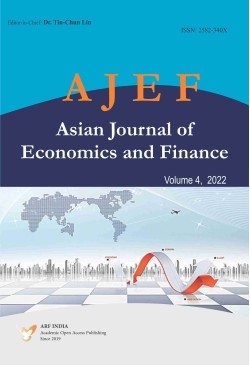
Asian Journal of Economics and Finance
Frequency :Quarterly
ISSN :2582-340X
Peer Reviewed Journal
The Relationship Between the Official Exchange Rate and the Parallel Exchange Rate in Vietnam: Evidence from Vecm Model
Effect of Indirect Taxation on Household Consumption in Nigeria
Impact of Exchange Rate Fluctuation on Economic Growth in Nigeria
This study examines the impact of exchange rate fluctuations on economic growth in Nigeria. The main type of data used in this study is secondary; sourced from Central Bank of Nigeria Statistical Bulletin of various issues. From 1986 being the year the monetary authority shifted from fixed exchange rate regime to flexible exchange rate regime to 2019. The correlation and regression analysis of the ordinary least square (OLS) were used to analyze the data. The result revealed that exchange rate has positive effect but not significant with (â=0.014, t = 1.783, Pns) this affirms previous studies that developing countries are relatively better off in the choice of flexible exchange rate regimes. The result also indicated that interest rate and rate of inflation have negative effect on economic growth but not significant with (â =0.002, t = 0.015, Pns) and (â = 0.023, t = 0.716, Pns) respectively. Therefore, the study recommended that government should encourage export promotion strategies in order to maintain a surplus balance of trade. In addition, government should provide a conducive environment for trade, adequate security, effective fiscal and monetary, as well as infrastructural facilities that would attract foreign investments in Nigeria.
Keywords: Exchange rate, Inflation, Interest rate, Economic Growth, Regression Analysis.
Miftahu Idris and Isaac Shuyur (2023). Impact of Exchange Rate Fluctuation on Economic Growth in Nigeria. Asian Journal of Economics and Finance. 5(1), 39-60.https://DOI: 10.47509/AJEF.2023.v05i01.03
Declining Contribution of Agriculture in Indian Economy in the Post Economic Reforms Period
The Impact of Climate Change on Egyptian Agriculture and Mitigation Priorities